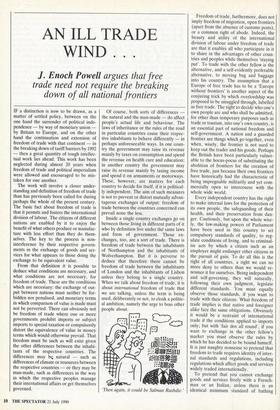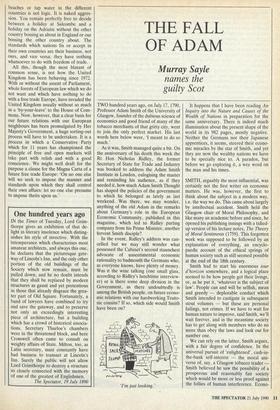AN ILL TRADE WIND . . .
trade need not require the breaking down of all national frontiers
IF a distinction is now to be drawn, as a matter of settled policy, between on the one hand the surrender of political inde- pendence — by way of monetary union by Britain to Europe, and on the other hand the continuation and extension of freedom of trade with that continent — in the breaking down of tariff barriers by 1992 — then a great quantity of tough intellec- tual work lies ahead. This work has been neglected during almost 20 years when freedom of trade and political imperialism were allowed and encouraged to be mis- taken for one another.
The work will involve a closer under- standing and definition of freedom of trade than has previously been called for during perhaps the whole of the present century. The basic fact about freedom of trade is that it permits and fosters the international division of labour. The citizens of different nations are enabled by it to enjoy the benefit of what others produce or manufac- ture with less effort than they do them- selves. The key to the process is non- interference by their respective govern- ments in the exchange of goods and ser- vices for what appears to those doing the exchange to be equivalent value.
From that definition it is possible to deduce what conditions are necessary, and what conditions are not necessary, for freedom of trade. These are the conditions which are necessary: the exchange of out- mit between nations must neither be for- bidden nor penalised, and monetary terms in which comparison of value is made must not be perverted. There can obviously not be freedom of trade where one or more governments prohibit imports or subject imports to special taxation or compulsorily distort the equivalence of value in money terms which would otherwise prevail. That freedom must be such as will exist given the other differences between the inhabi- tants of the respective countries. The differences may bc. natural — such as differences of climate or resources between the respective countries — or they may be man-made, such as differences in the way in which the respective peoples manage their international affairs or get themselves governed.
Of course, both sorts of differences the natural and the man-made — do affect people's actual life and behaviour. The laws of inheritance or the rules of the road in particular countries cause their respec- tive inhabitants to behave differently — in perhaps unforeseeable ways. In one coun- try the government may raise its revenue mainly by taxes on consumption and spend the revenue on health care and education; in another country the government may raise its revenue mainly by taxing income and spend it on armaments or motorways. These, however, are matters for each country to decide for itself, if it is political- ly independent. The aim of such measures is not to prevent or distort mutually advan- tageous exchanges of output: freedom of trade between the countries concerned can prevail none the less.
Inside a single country exchanges go on between those living in different parts of it who by definition live under thd same laws and form of government. Those ex- changes, too, are a sort of trade. There is freedom of trade between the inhabitants of Northampton and the inhabitants of Wolverhampton. But it is perverse to deduce that therefore there cannot be freedom of trade between the inhabitants of London and the inhabitants of Lisbon unless they belong to a single country. When we talk about freedom of trade, it is about international freedom of trade that we are talking, unless the term is being used, deliberately or not, to cloak a politic- al ambition, namely the urge to boss other people about.
'Then again, it could be Salman Rushdie.' Freedom of trade, furthermore, does not imply freedom of migration, open frontiers (apart from the absence of customs posts), or a common right of abode. Indeed, the beauty and utility of the international division of labour under freedom of trade are that it enables all who participate in it to share in the advantages of other coun- tries and peoples while themselves 'staying put'. To trade with the other fellow is the alternative, and a self-evidently preferable alternative, to moving bag and baggage into his country. The assumption that a Europe of free trade has to be a 'Europe without frontiers' is another aspect of the conjuring trick by which overlordship was proposed to be smuggled through, labelled as free trade. The right to decide who one's own people are and who shall be admitted, for other than temporary purposes such as trade or tourism, into one's own country, is an essential part of national freedom and self-government. A nation and a guarded frontier are things which go together, even when, wisely, the frontier is not used to keep out the trader and his goods. Perhaps the British have been particularly vulner- able to the hocus-pocus of substituting the abolition of frontiers for the creation of free trade, just because their own frontiers have historically had the characteristic of being impregnable militarily and yet com- mercially open to intercourse with the whole wide world.
Every independent country has the right to make internal laws for the protection of its own people, the safeguarding of their health, and their preservation from dan- ger. Cautiously, but upon the whole wise- ly, the law-making powers of Parliament have been used in this country to set compulsory standards of quality, to reg- ulate conditions of living, and to criminal- ise acts by which a citizen such as an employer might endanger other citizens in the pursuit of gain. To do all this is the right of all countries, a right we can no more deny to others than we would re- nounce it for ourselves. Being independent and self-governing, they will naturally, following their own judgment, legislate different standards. You must equally observe those standards, if you want to trade with their citizens. What freedom of trade implies is that native and foreigner alike face the same obligations. Obviously it would be a restraint of international trade if the conditions applied to imports only; but with 'fair dos all round', if you want to exchange in the other fellow's market you must observe the rules by which he has decided to be bound himself.
It is just naughty nonsense to pretend that freedom to trade requires identity of inter- nal standards and regulations, including regulations which affect goods and services widely traded internationally.
To pretend that you cannot exchange goods and services freely with a French- man or an Italian, unless there is an identical minimum standard of bathing beaches or tap water in the different countries is not logic. It is naked aggres- sion. You remain perfectly free to decide between a holiday at Salcombe and a holiday on the Adriatic without the other country bossing us about in England or our bossing the other country about. The standards which nations fix or accept in their own countries are their business, not ours, and vice versa: they have nothing whatsoever to do with freedom of trade.
All this, though the most blatant of common sense, is not how the United Kingdom has been behaving since 1972. With or without the assent of Parliament, whole forests of European law which we do not want and which have nothing to do with a free trade Europe, have invaded the United Kingdom usually without so much as a 'by-your-leave' to the House of Com- mons. Now, however, that a clear basis for our future relations with our European neighbours has been promulgated by Her Majesty's Government, a huge sorting-out process will have to be undertaken. It is a process in which a Conservative Party which for 11 years has championed the principle of free and open markets will take part with relish and with a good conscience. We might well draft for the purpose a clause for the Magna Carta of a future free trade Europe: 'On no one else will we seek to impose the manner and standards upon which they shall control their own affairs: let no one else presume to impose theirs upon us.'



















































 Previous page
Previous page